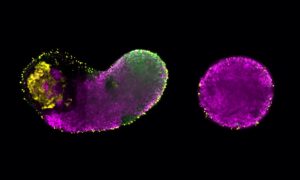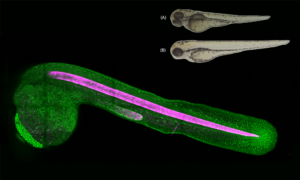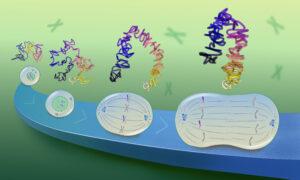
Unravelling epigenetic reprogramming
Scientists at EMBL Rome reveal a new paradigm for establishing ‘epigenetic memory’ during development

A study conducted by the Hackett group at EMBL Rome has identified key factors controlling the complex system of gene regulation during early embryo development, shedding new light on the mechanisms behind these events and on their evolutionary implications. Their findings are published in Nature Structural and Molecular Biology.
Wiping the slate clean
The cells in an early embryo are described as pluripotent – in other words, they have the ability to become any of the various cell types in the body. As the embryo develops, its cells divide and take on more specialised roles, eventually becoming fixed as a particular cell type such as a skin cell or nerve cell. An important part of this process involves epigenetic changes – chemical modifications to the DNA or its associated proteins that affect gene expression without changing the DNA sequence. The specialised cells in the adult organism have the same genetic code as those in the early embryo, but these epigenetic changes push them to become a specific cell type.
A newly formed embryo must therefore go through a process known as epigenetic remodelling, in which the epigenetic changes inherited from its parents are erased, allowing its cells to become pluripotent again. One type of epigenetic change is a chemical modification to the DNA known as DNA methylation (DNAme). Epigenetic remodelling involves active DNAme erasure and inhibition of the cellular machinery responsible for DNAme. However, a complete understanding of how this molecular network regulates genome-wide epigenetic remodelling is still missing.
EMBL Rome’s Hackett group performed a CRISPR screen, in which they deleted 19,000 genes in turn to analyse the function of each one. They identified many genes involved in epigenetic remodelling and decided to focus on two of them, known as Dppa2 and Dppa4. These genes are puzzling. When they are deleted in mice they cause death due to lung failure, even though they are only switched on during very early development – the first five days in mice, which is long before any tissues are formed. The reason for this long-term effect is that Dppa2 and Dppa4 establish the correct epigenetic state of important developmental genes during early embryo development, and this state is maintained throughout development to ensure that genes are switched on at the right time. This is a beautiful example of epigenetic ‘memory’ of past events influencing future processes.
Hijacking the epigenetic machinery
As well as key developmental genes, Dppa2 and Dppa4 also seem to control the expression of certain DNA regions that belong to a group known as LINE1 elements. These are regions of DNA that are able to copy and paste themselves into other locations in the genome. Cells usually exert a tight control over these elements by repressing their expression. However, some LINE1 elements that have occurred more recently in evolutionary time might have acquired Dppa2 or Dppa4 binding sites to escape cellular repression and permanent epigenetic silencing, allowing them to evade the cell’s defences.
The work of the Hackett group is supported by evidence from other research groups that appears in the same issue of Nature Structural & Molecular Biology, describing how a balance of DNA methylation and epigenetic remodelling is achieved during early development and the role played by Dppa2 and Dppa4 in these events.
The results obtained by the Hackett group reveal a new paradigm for how epigenetic memory is put in place, and extend beyond the specific cases of Dppa2 and Dppa4. In fact, the CRISPR screen led the team to uncover a substantial set of genes that regulate epigenetic changes, paving the way for further research in the field.


